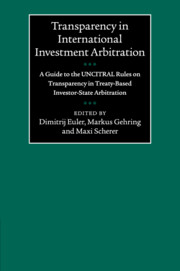 Transparency in International Investment Arbitration
Transparency in International Investment Arbitration Book contents
- Frontmatter
- Contents
- Contents
- List of contributors
- Foreword
- Acknowledgements
- Table of treaties, guidelines and rules
- Table of cases
- List of abbreviations
- 1 Introduction
- 2 Public interest in investment arbitration
- 3 Article 1. Scope of application
- 4 Article 2. Publication of information at the commencement of arbitral proceedings
- 5 Article 3. Publication of documents
- 6 Article 4. Submission by a third person
- 7 Article 5. Submission by a non-disputing Party to the treaty
- 8 Article 6. Hearings
- 9 Article 7. Exceptions to transparency
- 10 Article 8. Repository of published information
- 11 The application of transparency
- 12 Conclusion: The Rules as a swing of the pendulum?
- Index
9 - Article 7. Exceptions to transparency
Published online by Cambridge University Press: 05 August 2015
- Frontmatter
- Contents
- Contents
- List of contributors
- Foreword
- Acknowledgements
- Table of treaties, guidelines and rules
- Table of cases
- List of abbreviations
- 1 Introduction
- 2 Public interest in investment arbitration
- 3 Article 1. Scope of application
- 4 Article 2. Publication of information at the commencement of arbitral proceedings
- 5 Article 3. Publication of documents
- 6 Article 4. Submission by a third person
- 7 Article 5. Submission by a non-disputing Party to the treaty
- 8 Article 6. Hearings
- 9 Article 7. Exceptions to transparency
- 10 Article 8. Repository of published information
- 11 The application of transparency
- 12 Conclusion: The Rules as a swing of the pendulum?
- Index
Summary
9.1 Introduction
9.1.1 Scope and purpose
1. Article 7 of the Rules is the provision limiting the principle of transparency as promulgated in Articles 2 to 6 of the Rules.
2. In view of the mandatory nature of the Rules, the inclusion of certain limitations seems not only appropriate, but a mere necessity to strike a balance between the public interest in transparency and the interest of the parties in a fair and efficient resolution of their dispute. Publishing all information without taking into consideration their nature or possible impact when made public would mean ignoring justified party or public interests to keep certain information confidential. Transparency can neither be an end in itself, nor absolute. Where concrete and substantial interests outbalance the general public interest in transparency, the latter has to step back..
3. Article 7 defines such substantial interests colliding with the principle of transparency and gives procedural guidance on how to deal with them.
4. As a principle, Article 7 deals only with exceptions to the flow of information from within a specific arbitration procedure into the public sphere.
5. The Rules do not deal with information (only) in the sphere of a party to the proceedings and the mechanisms under which such information comes into the arbitration proceeding. This is an issue of evidence. Article 7 of the Rules is no guide when it comes to issues of discovery, document production and evidentiary privilege claims, i.e., which information has to be disclosed by a party in such a procedure or under an order pursuant to Article 27(3) of the Arbitration Rules (2010).
- Type
- Chapter
- Information
- Transparency in International Investment ArbitrationA Guide to the UNCITRAL Rules on Transparency in Treaty-Based Investor-State Arbitration, pp. 249 - 306Publisher: Cambridge University PressPrint publication year: 2015


